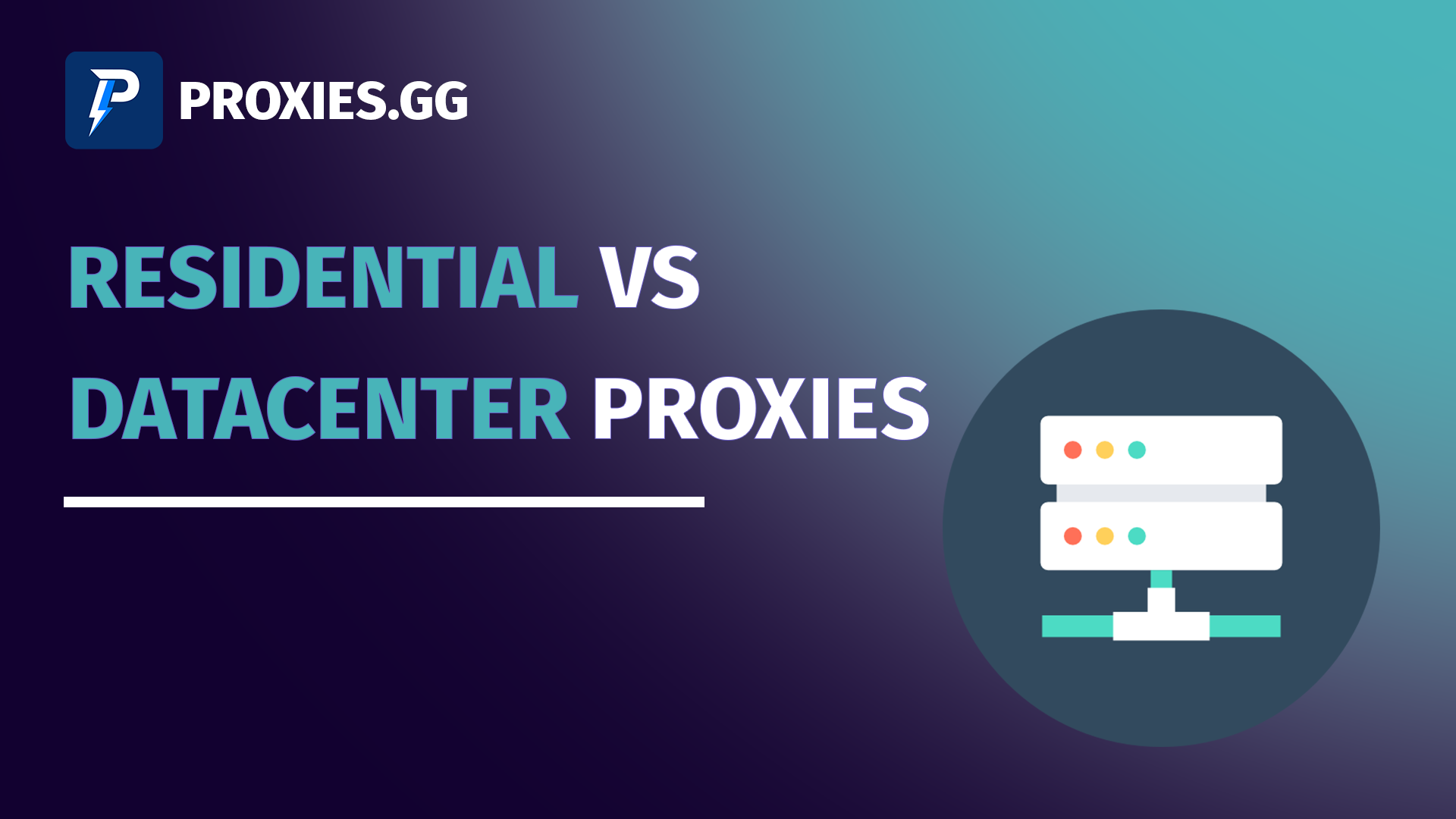
Residential Proxies vs Datacenter Proxies
Proxies are essential in maintaining web anonymity and security. Both datacenter and residential proxies hide your IP. They replace your IP in the eyes of the website you're visiting. Residential proxies are, however, considered to provide more anonymity. On the other hand, data center proxies are less expensive. Compared to residential proxies, they also offer better response rates.
Datacenter Proxies
They are the most common form of proxies. They provide access to restricted web content and also collect data from the web. A data center proxy has its IP, location, and it can forward all connection requests through it. It hides your IP address and your site instead of showing its own.
Third-party servers of companies that host the web also host data center proxies. These include Google cloud or amazon AWS according to Proxyway.
They do not have any affiliation with internet service providers, and they are more cost-effective.
In operation, a data center acts as an intermediary between your workstation and the website you are visiting. When you make a request, the same goes to the data center, which assigns you a different IP and then sends the request to the website. The response to your query has to go through the data center before traveling back to you. Since data center proxies sell IPs, the providers do not limit the traffic you can use.
Datacenter IPS:
· Have a strong performance
· They are quite affordable
· Have a simpler detection
· Have no rotation
Examples of datacenter proxies include:
· Public proxies: You can find these on the web for free. They are also called free web proxies
· Shared proxies: Several people use these at a go, saving significantly on costs
· Private proxies: A single individual uses these at a go. It’s considered the most expensive compared to public and shared proxies
· Dedicated proxies: These are similar to private proxies. However, they only perform a specific task
Datacenter proxies are ideal for:
· Browsing anonymously
· Budget restrictions
· Gaming
· Unprotected websites that do not care about IP reputation
· Any project that puts speed as the most critical factor compared to successful requests
Residential Proxies
Internet service providers provide residential proxies. Often, they can also be available to connect proxies. You can have them installed on personal devices. Unlike data center proxies, their detection is much harder since they are not in data centers.
Upon sending a request through a residential proxy, your traffic gets routed through a proxy on an actual device. This device has the IP of an internet service provider. It makes it harder to differentiate between residential proxies and standard IP addresses.
Since most of these are in real homes, you are less likely to get blocked when sending requests. The trick behind it is because, from the target's perspective, you are a regular user. These proxies work as a rotating system.
As such, each time you send a request, the residential proxy redirects you to another proxy randomly. Upon blocking one of the proxies in a residential network, you get another proxy to work with.
When should you choose a residential proxy?
· When the target website easily bans you upon detection of bot traffic or has a strict protection mechanism
· When you cannot afford extended bans because of limitation of time
· When you need proxies from countries or cities not provided by data center proxies
· When the task you are performing is location-sensitive
Residential proxies also provide you with access to millions of IP addresses from across the globe. They also make sure your target is unaware that you are using a proxy since you appear as a regular user from their end.
According to Proxyscrape, residential proxies are perfect for:
· Testing websites
· Monitoring Search engine optimization (SEO)
· Verification of ads and testing affiliate links
· Scraping the web
· Brand protection
· Accessing content that blocked in your location
· Accessing information on projects concerning websites that ban IPs from data centers
To acquire residential or mobile IP addresses, proxy providers must have expressed consent. The permission allows them to monitor reviews, scrap public information, or do any other thing you want the proxy to do.
What are some of the benefits of residential proxies?
They offer more versatility: They are usable for any purpose. Since the residential proxies appear as real IPs, they can do anything without looking suspicious
They are more reliable since they make use of legitimate IP addresses. Blazingcelloc states that this results in more legitimate results when browsing. Tailoring search results to fit a specific geolocation area is easier since they use existing residential addresses
They provide more authority since they offer the highest data quality and protection.
They provide a big proxy pool since many ISPs have millions of IPs at their disposal. As such, you can make different requests without dealing with the same IP more than once. They also have high subnet diversity. It is because their IPs rarely shares a subnet
The source of the IP is the most significant difference between residential and datacenter proxies.
Residential Vs Datacenter Proxies
Since residential proxies are from actual internet service providers, people view them as more legitimate. It is different from datacenter proxies since they are from cloud servers. Additionally, smart proxy states that security systems trust residential IPs because they can only assign them to actual residences. This makes them more vulnerable to detection and blacklisting.
It’s harder to blacklist residential proxies compared to data center proxies.
Residential proxies are costlier compared to datacenter proxies. The cost factors in privacy because they provide more anonymity and their chances of blacklisting are low. They are also harder to get and maintain. Additionally, data center proxies are cheaper because sourcing them is easier. As such, they are suitable for organizations working with a limited budget. Since they are easily banned, their low price makes it easier for users to buy them in bulk.
Unlike data center proxies, whose pricing model relies on the number of IPs, residential proxies pricing is dependent on traffic.
Residential proxies also provide a wider range of locations for connection. This is possible because of their rotating nature, which then makes it possible to circumvent geographical blocks.
For sneakers, residential proxies are better. Though datacenter proxies are good in terms of reliability and speed, they can only operate on two accounts. Using many accounts makes the proxy prone to subnet bans. What are the pros and cons of residential vs. datacenter proxies for sneakers, for example?
· Bans: The unique nature of residential proxies makes them better. Detection of IPs for datacenter proxies leads to subnet bans.
· Speed: Datacenter proxies are faster. Moving too fast, however, leads to detection resulting in blocking.
· Usability for international releases: Residential proxies are usually geotargetable, whereas datacenter proxies only work in the servers' country.
In terms of volume, datacenter proxies provide a larger volume of IP addresses, making switching easier when one IP address gets a ban. It also makes it easier to use different IPS for different requests.
When using datacenter proxies, it's easier for a server to tell when a request is coming from a data center. This is not the case for a residential address. In some cases, websites might block all data originating from data center IP addresses. So if you need information from such kind of a website, you're majorly disadvantaged. Other websites block all IPs from subnets with bot-like activity.
To create data centers in different geographical locations, you need to have servers there. This differs from residential proxies, which can access information from other places because of hosting Internet service providers.
Datacenter proxies also have low subnet diversity. The fact that they come in the form of proxy lists, juggling between them is hard. Since the proxies come from a range of different IP addresses, abuse of one of the IPs leads to blocking the whole range. The action can make you lose perks associated with rotating proxies.
How to Choose the Best Proxy
If you decide to get a proxy, balancing the cost created and the time wasted is essential. The cost of proxies has a direct relationship to its quality of service. Expensive proxies have fewer bans which saves time. You can share the cheaper options with other people, making them slower. They also have a higher rate of bans than expensive proxies.
If your organization relies on data scraping from the web, investing in residential proxies is the best way to go. Though expensive, they are of better quality, are more reliable, and offer the highest security levels. It is also essential to evaluate your case and the intended use when choosing your proxy. Being anonymous is only beneficial when you use proxies that are not easy to identify as such.


